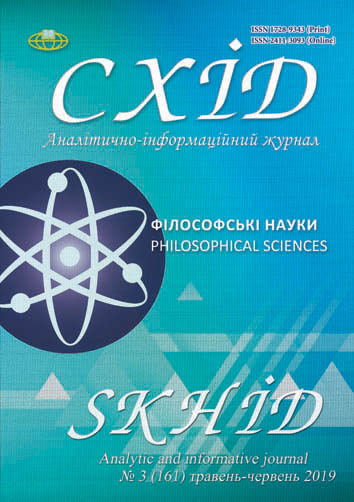Value and semantic orientation of a Gothic personality in Scotus’s axioms of beatitudo aspiration
DOI:
https://doi.org/10.21847/1728-9343.2019.3(161).171719Keywords:
Duns Scotus, bliss, will, personality, value and semantic orientation, individual developmentAbstract
A common conviction of Modernism about personality’s absence in the High Middle Ages is criticized in the issue. From Duns Scotus’s axioms, scholastic directives about necessary aspiration of bliss which characterizes a true Christian believer, the author has proved that scholastic doctrines of the period are aimed at a process of moral, reflective and responsible person formation whose deliberately remains an unchanged balance between individual and collective values. The hermeneutical, phenomenological, logical and critical methods are used to reveal social and mental senses of ethical and religious category of bliss in Duns Scotus’s doctrine and axiological mainstreams’ determination of personality development in the High Middle Ages. The Scotus’s interpretation of bliss aspiration is proved to state a concept of active individual development and emphasizes a process of personality formation, encourages a man to self-control and the inner world harmonization according to Christian canonical values and ideas of believers from various communities - families, corporations, states, which create the integral “Christian community” (corpus Christianorum). A béatitudo aspiration is a hierarchical guideline and a mean of active spiritual and moral motion beginning, as well as it is one of the will’s direction facilities toward an ideal object. The bliss aspiration provides an opportunity to realize abilities of will-love, to overcome depravity interim ethics, by eliminating its contingent notion, and after having known a natural sphere of bliss, wishing happiness. Scholar considers béatitudo a bail of Love and God’s plan in an ordinary human life, as a certain man’s gift that facilitates to reach finis ultimus. Despite a level of depravity a man should personally harmonize two spheres of bliss, in particular private and universal spheres. Nevertheless, due to a natural law human nature primarily desires happiness in a private sphere, and then bliss in a universal sphere that will be reached by a posteriori acts of will and an equal dilemma solution. A philosophic interpretation of a bliss category is created for the first time. The perspectives of further study will allow contemporaries an additional opportunity to understand the anthropological transition from traditional way of thinking to rational and individual one and to determine the internal filling of medieval human’s spiritual world, that are the mental milestones in a process of a European personality formation.Downloads
References
Bibikhin, V. V. (2009). Ranniy Khaydegger: Materialy k seminaru. Moscow: Institut filosofii, teologii i istorii sv. Fomy, 536 p. (In Russian)
Duby, Georges (2003). Doba soboriv: mystetstvo ta suspilstvo 980-1420 rokiv (translat. from franch). Kyiv: Yunivers, 302 p. (In Ukrainian)
Averintsev, S. (1976). Sudby yevropeyskoy kulturnoy traditsii v epokhu perekhoda ot Antichnosti k Srednevekovyu. Iz istorii kultury Srednikh vekov i Vozrozhdeniya. Moskva: Nauka, Pp. 17-64. (In Russian)
Tierney, Brian (2004). The Idea of Natural Rights-Origins and Persistence. Northwestern Journal of International Human Rights; Issue 1; Article 2: 2-12. Retrieved from https://scholarlycommons.law.northwestern.edu/ (Accessed: 19.03.2019)
Arendt, H. (2013). Zhizn uma: (translat. of A.V. Govorunov). St. Petersburg: Nauka, 517 p. (In Russian)
Mayorov, G. G. (ed.) (2001). Duns Skot kak metafízik. In: Skot Ioann Duns. Izbrannoye. Moskva: Izd-vo Frantsiskantsev, 584 p. (In Russian)
Gilson, E. (2011). Dukh srednevekovoy filosofii. Moscow: Institut filosofii, teologii i istorii sv. Fomy, 560 p. (In Russian)
Koplston, F. Ch. (1997). Istoriya srednevekovoy filosofii (translat. of I. Borisova). Moscow: Enigma, 512 p. (In Russian)
Sweeney, M. (2001). Lektsii po srednevekovoy filosofii. Issue 1: Sredevekovaya khristianskaya filosofiya Zapada (translat.). Moscow. 304 p. (In Russian)
St. Augustine. (2000). O grade Bozhiyem. Minsk: Kharvest, Moscow: AST, 1296 p. (In Russian)
Bychkov, V. (1999). 2000 let khristianskoy kulture sub specie aesthetica. In 2 vol. Vol.1: Ranneye khristianstvo. Vizantiya. Moscow-St-Peterburg: Universitetskaya kniga, 575 p. (In Russian)
Bandurovskiy, K. V. (2011). Bessmertiye dushi v filosofii Fomy Akvinskogo. Moscow: RGGU, 328 p. (In Russian)
McGrath, A. (2008). Intelektualni vytoky yevropeyskoyi Reformatsiyi (translat from English). Kyiv: Nika-Tsentr, 344 p. (In Russian)
Bettoni, E. (1961). Duns Scotus: the basic principles of his philosophy. Washington, 214 p. (In English)
Dumont, S. D. (2002). John Duns Scotus. A Companion to Philosophy in the Middle Ages, P. 353-369. (In English)
Duns Scotus, Johannes (2001). Izbrannoye. Moscow: Izd-vo Frantsiskantsev, 584 p. (In Russian)
Downloads
Published
How to Cite
Issue
Section
License
Copyright (c) 2019 Oleg Turenko

This work is licensed under a Creative Commons Attribution-NonCommercial-NoDerivatives 4.0 International License.
1. Authors bear responsibility for the accuracy of facts, quotations, numbers and names used.
2. Manuscripts are not sent back.
3. The publisher does not always agree with the authors' opinion.
4. The authors reserve the right to authorship of the work and pass the first publication right of this work to the journal under the terms of a Creative Commons Attribution-NonCommercial-NoDerivatives 4.0 International License. This license allows others to distribute (copy) the published work for non-commercial purposes, provided there is mandatory attribution to its authors and a link to the first publication in our journal.
5. The authors have the right to conclude separate supplement agreements that relate to non-exclusive work distribution in the form in which it has been published by the journal (for example, to upload the work to the online storage of the journal or publish it as part of a monograph), provided that the reference to the first publication of the work in this journal is included.

